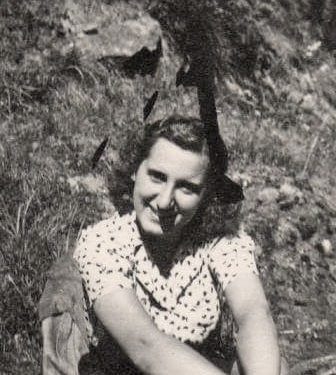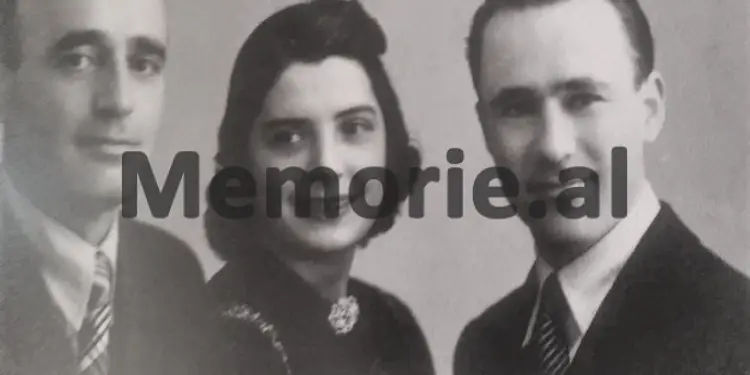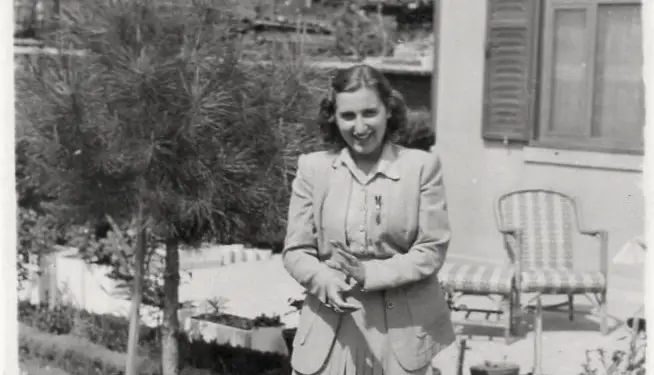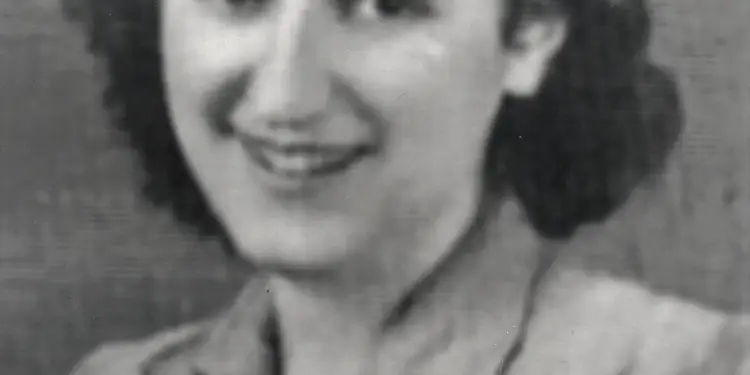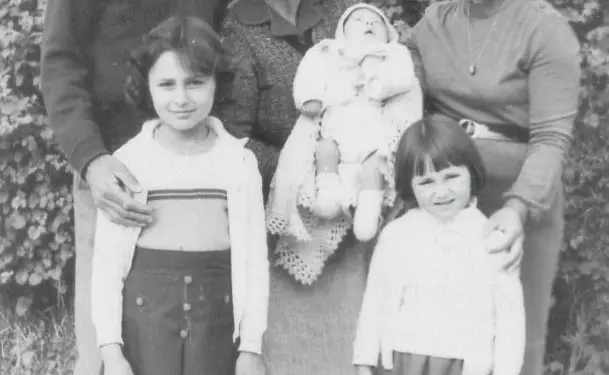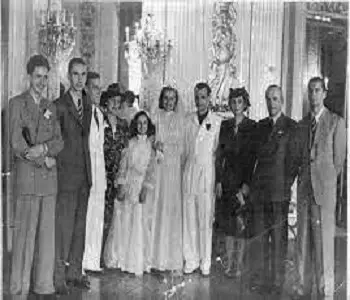By Elena Gjika Merlika – Kruja
Memorie.al / Tepelena…! A forced labor concentration field, a camp, populated by two thousand human beings who arrived, almost all of them from the North of Albania: old men, women, children, uprooted in a few hours from their homes and gathered in five barracks. And to think that then, the entire Albanian population did not reach one million! The chosen place was calculated to the smallest detail: wide lowland, almost like a small battlefield, surrounded by the barracks, the rear and military base for the Italian army during the Italo-Greek War in the years of the Second World War.
All around were mountains, an icy wind in winter made life impossible for us, barbed wire everywhere, a strict ban on lighting a fire for warmth at the risk of being tied up all night outside in frost. Waking up was early in the morning. Four hundred men in each barrack, crammed together on two floors of unbroken plank beds along its entire length.
No more than two feet was allowed for each of us; the mattresses, to anyone lucky enough to have them, looked like small, narrow alleys. The names were called, hurriedly, and then I left for work.
All the young men on the mountain: two hours of walking was not enough to reach, to then scramble up a very narrow and steep path up to where the forest where we worked was.
You had to have strong arms and muscles to cut down the logs with an axe, to spear them down on your back into a small piled meadow, to get back up and down several times with the load until you the amount requested by those accompanying us, the camp guards, was met.
We likened him to a caravan that, in an Indian line, barely went up and down in silence, with aching feet, sometimes bleeding, shod with a piece of pigskin that, together with the laces, took the form of sandals.
Until the evening with an empty stomach and a sore mouth from the lack of water: at sunset, the long line of these human beings was again put on the road to return “home”. We were always loaded with wood, long, thick pieces tied with rope on our backs.
It was already night when we reached the camp.
The old, the sick, anxiously awaited our return behind the wall of barbed wire; then the children. I can never forget our children who came before us, barefoot, ragged, the children we left in the morning praying to God that we would find them safe and sound at dinner.
But how many mothers returned to find a corpse: diseases, especially among children, reaped merciless victims. There were no drugs. A doctor and a persecuted one, because he was not a trusted communist, whose professional skills were rendered powerless by so many disasters and miseries, put his hands on his head when he entered the camp.
However, the Albanian woman, the Albanian mother of those years had a stoic determination: she buried her child with her own hands, without shedding a single tear. There were no more tears in our eyes, we had shed them all! The next day he went to work, and so on for years. A pot of boiled water with some beans in it, and a piece of bread that was our food; in the morning some dark colored water that should have been “tea”.
Christmas of 1951 was approaching. Some priests, Dom Nikoll Mazreku, Father Viktor Volaj, Father Jak Gardin, the latter Italian, were fellow exiles with us. I don’t remember the names of the others. We thought of blessing him that Christmas with a Mass.
There were not only Catholics in our camp, there were Muslims, Orthodox, but the initiative had to be ours and it was not easy. In 1951, churches and mosques were still open, but laws were being prepared that would approve their closure and establish atheism as the “religion” of the State.
The camp management flatly opposed our request: “Whatever “Christmas” means – said director Xhaferr Pogaçe, – we only know Easter”. With immense patience we explained to him that Easter commemorated the death of our Jesus, but Christmas was the holiday of all humanity because it celebrated his birth.
Nothing, more than Christmas, fell on Sunday, but it seems to me that in that distant 1951, on a working day. We assured them that we would all go to work, no matter what, so long as they allowed us to return a little sooner, before it got dark. We had no lights, no candles, not even a candle.
How many prayers to our jailers, but we were all in one word, regardless of each one’s faith, where they gathered us to start the mountain road on our work, we did not move until we were promised that we could pray the Holy Mass that, in ignorance theirs, they couldn’t understand what it was and why we wanted it so much.
Where this Mass would be said? We were assigned the ruins of a barracks, almost destroyed by Greek shells, where only one wall miraculously remained standing, but where there was room for everyone.
Thus began the work of cleaning the place from stones, blocks, herbs and garbage, always after work, in the dark with the flame of lit pine pieces that served as light torches.
Dom Nikola and Father Gardini were smiling among us, helping us. Father Gardini organized the choir: there were no more than seven or eight men and women, but we made it to the top. Don Nicolli would lead the mass.
We ran back from work on December 25, 1951. The ruined barracks were full of people. The altar, resting on the only wall left standing, rested on a well-arranged pile of stones covered by a white sheet.
Dom Nikolli, having secretly kept a cup and some host, began the mass. Almost imperceptibly the guards of the camp approached “to keep watch,” but I believe more to beseech, to see what it was that we had prayed so much for.
Who gave our voices so much power that the echo seemed to reach the city? “Adeste fideles”, “Night of the stars”, “You come down from the stars” spread in space, making everyone present sad. Dom Nikolli, in the sermon, uttered a few words, simple, and deep, like those that only Christianity can inspire.
Not even the slightest breeze could be heard; finally, the pleasant and deep notes of Ave Maria, while the priest repeated as in centuries “Ite Missa est” and there was an explosion of tears and hands rising up towards the sky…! Then everyone loudly chanted “Christus vincit, Christur regnat”; it was already night.
Dom Nikoll Mazreku and Father Gardini, if they are still alive, I don’t know if they will ever read these simple lines, but whoever was present, like me, in that event will never forget them.
I lived 47 years in the internment camps, from Tepelena to Vlorë, Kantieri 216, from Tirana, Camp no. 3, in Lushnjë, Gradisht, Pluk, Savër and finally in Grabian, labor and deportation camps.
I was foreign, Italian, graduated, but I worked with the highlanders, with the peasants who taught me how to put the load of wood on the back, how to wear the pigskin boots, who were surprised how I lived, spoke, dealt with the problems of them when they asked me for some advice, but they showed me love and gave me courage, we have spent a whole life.
Back in 1990, in Italy I was able to see a Church, approach an altar, and receive Holy Communion.
Everything is beautiful, fascinating, but nothing can compare to the emotion so deep, so literal of that distant Christmas of 1951, amid so much pain, so much suffering but also so much hope in the Blessed Virgin, whose Rosary accompanied our return from that inhumane and unjust work, the fruit of a false and cursed ideology.
The years passed in our camp, always between the work of the barracks, between diseases and shortages of every kind. How much the elderly and the sick suffered, what tortures they went through, was understood when the hygienic conditions in which they lived were shown. The shelters, ten in total, for two thousand people, were about two hundred meters away.
You had to go there at night, even if you were sick or impossible, otherwise the punishment was inhumane: a can of excrement was hung around the man’s neck and he was forced to walk around the camp for a day, two, three, until he our executioners called “reasonable”. It was for crying and laughing that terrible tragedy!
It was 1952; we had been “guests” in Tepelena for five years. I lived with my mother-in-law and my son; we seemed one body and one soul. My husband, who was sentenced to 15 years of forced labor as an “Enemy of the people”, followed his ordeal in the terrible camps of Maliq, where the prisoners had to drain the swamp with their arms and not with mechanical tools.
Giant canals, which were supposed to lead the many waters of the swamp to the sea, to free hundreds of thousands of hectares of land, this was the object of the work of the “enemies of the people”. For years we haven’t seen each other, sometimes we exchanged a few lines, when they allowed it, to make sure we were alive.
Spring came; the mountains were clothed with firs, many firs with their yellow color and fragrance. The beautiful season should give us some comfort and more power in our work. While for us it was the beginning of an anxiety: migrations started for work reasons.
Other camps awaited us, other hardships, other “plans” of the communist regime, to be restored “for the good of the people”, through our sufferings and humiliations.
In that year the whole country was hit by a very serious influenza epidemic, which had many victims, and one can imagine the consequences for Tepelena, where there was no form of medical aid, where there was no medicine, where it was stopped the fire, many died, especially old people and children.
The lack of food, the spreading virus, the crowd in those barracks, turned us into walking skeletons; however, we had to get up every morning and go to work, whoever was left half-dead on the street was carried to the camp by two comrades by the arm or by taking turns carrying him on the back. Mother-in-law and son became seriously ill; miraculously I escaped the contagion of the disease, so I could serve them when I returned from my night work.
They started to get better because the great God put His hand, because we had no means except for an herb that I collected on the mountain, boiled and with that bitter juice I gave him something warm.
The cold was lessening as the days went by, May was approaching, and the epidemic was diminishing in scope and danger.
On a beautiful sunny day we awoke to the surprise of a number of bright trucks, with a large group of policemen accompanying them, led by a young officer, with a less severe demeanor than our usual guards and more educated. He came from Tirana and had to represent “with dignity” those who had sent him.
We didn’t go to work that day: a general meeting was held in the vast field of the camp, where figures and data were read about the great achievements of the regime for the “good and progress of the people”, other work programs and, as conclusion, the list with the names of those who, within an hour, had to leave the Tepelena camp for work reasons and would move elsewhere, in an unknown direction until the moment of arrival at the designated place.
A complete silence from those present and a trembling reception: first the need for thirty women workers, my name first on the list, “at the top of the classification”, then another 29; then the men for two different purposes, a hundred with us women, a hundred elsewhere.
All said and done: within an hour, the mattress was folded and tied, a wooden suitcase in hand, and everyone lined up in front of the trucks that had to load the belongings and, on top of that, thirty people in each vehicle.
Vain pleas to replace me with someone who didn’t have children. Many young women appeared who were ready to take my place, because I had a child and an old and sick mother-in-law. They begged the commander of the operation to leave me in Tepelena with my loved ones, but it was not possible.
I can never forget that scene: my mother-in-law, almost a shadow, watching me from the door of the big barracks, my son climbing on the side of the car and calling me, the policeman beating his hands with the butt of his rifle, the one who it rained but it didn’t rise and we who were huddled next to each other on the mattresses in a grave silence.
They gave us a ration of bread and a leek; it was enough for one day! The tears of the mother-in-law, who had replaced the mother whom I had not seen for ten years, will never fade from my memory along with the thin voice of my child “mama, mama”.
Other women took it better and told me to leave quietly because they would take care of him that soon we would be together again…! The long line of cars started and little by little the images of our loved ones and the sight of that accursed camp disappeared.
I left and never saw Tepelena again. We spent long years in other camps, different places, but always with an anxiety that printed and drove us: the unknown of tomorrow. Memorie.al




